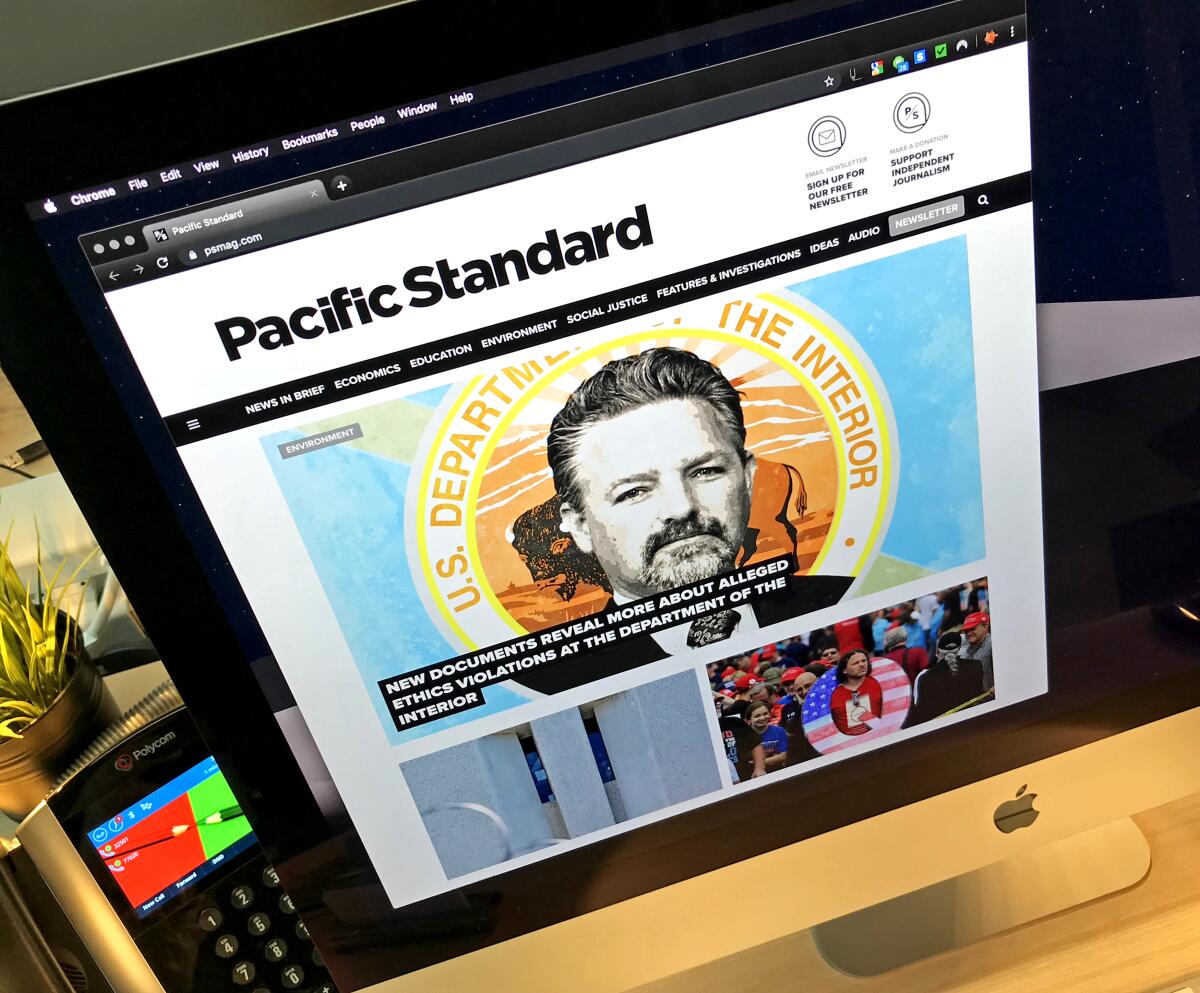Pacific Standard magazine is shutting down after losing main financial backer

- Share via
Pacific Standard, an online magazine that aimed to be a Western U.S.-based chronicler of global social and environmental justice and public policy, plans to shut down after a decade of publication, the magazine’s editor in chief, Nicholas Jackson, said Wednesday.
The publication’s last day will be Aug. 16 and the decision by the board of Pacific Standard’s backer, the nonprofit Social Justice Foundation, came without warning, Jackson said in a phone interview.
“This is a tough day,” said Jackson, who has been editor-in-chief for four years.
The foundation was started by academic publishing mogul Sara Miller McCune of Santa Barbara, who established the magazine — first titled Miller-McCune — in 2008. It was also operated as a nonprofit.
In a series of tweets earlier Wednesday, Jackson said: “I’m heart-broken and devastated” by the decision, but also “proud of what we accomplished.”
“We were repeatedly and enthusiastically told we were over-performing and delivering up until the very end, and that we had a long-term commitment,” he said.
Pacific Standard’s goal, as Jackson put it, was to provide “nonpartisan, science-informed reporting on social and environmental justice.” The magazine’s website currently lists stories covering such topics as fair housing protections in Los Angeles, issues surrounding Venezuelan refugees, alleged ethics violations at the Department of Interior and the state of rural schools.
Jackson said the call to close Pacific Standard was made by its four-member board of directors that includes board President Clive Parry, who’s also a vice president at McCune’s Sage Publishing, which publishes academic books and journals.
Parry made the announcement to Pacific Standard’s staff at its Santa Barbara headquarters Wednesday and indicated the decision stemmed from Sage’s decision to curb its charitable giving, Jackson said. A call to Parry at the Social Justice Foundation was not immediately returned.
Jackson said he also had reached out to McCune, but that she had not responded. A call to McCune through her McCune Foundation was referred to the magazine.
Pacific Standard has about 20 full-time employees, 25 writers on contract and dozens of freelance writers who contributed to the publication, Jackson said, adding that the employees were offered severance packages.
Pacific Standard’s closure is another blow to the publishing world, which has struggled in the last decade to shift to the digital market from print while remaining financially viable.
Indeed, the magazine Governing, which has covered state and local government for the last 32 years, also said Wednesday that it plans to end operations.
But Pacific Standard was unique in that its backing was a nonprofit foundation as opposed to, say, a publicly-held entity concerned about its shareholders and quarterly results.
McCune committed about $2.2 million a year for five years when she launched the magazine, telling the Los Angeles Times that she hoped to share the sort of social science research that her academic and journal publishing company — one of the largest in the world — published behind paywalls.
Pacific Standard’s operating costs had climbed to more than $3 million a year, according to the Social Justice Foundation’s most recent tax filings, which also show that the magazine was funded almost entirely by those contributions, bringing in less than $200,000 in additional revenue most years. In 2014, McCune told the Bookseller that Sage Publishing, which provided almost all of the foundation’s funds, had revenues “in the $300m-$400m range.”
“I honestly don’t know what it takes, beyond a billionaire, to keep a niche media company afloat,” said Reyhan Harmanci, a member of Pacific Standard’s editorial advisory board, who only heard of the closure when Jackson announced it on Twitter. “We need smaller, smarter publications to do interesting work that might fall through the cracks elsewhere.”
Eric Zassenhaus, Pacific Standard’s digital product manager, likewise said the decision to close the magazine was “totally abrupt” and that “we were expanding up until the moment we shut down. We had several projects in motion.”
“The irony is many of the stories I know we had coming out in the next couple weeks had been killed from other places,” Zassenhaus said.
The future of the magazine’s archive is uncertain, with Zassenhaus noting that the foundation’s representatives “said they were going to do their best to make sure that it lived on, but they did not have any plans.”
The magazine had long served as an incubator for younger writers and was one of only a handful of major magazines based on the West Coast.
“I think it’s been a really valuable part of the media ecology,” said James Fallows, a longtime national correspondent for the Atlantic who also serves on Pacific Standard’s editorial advisory board. “It’s been of national and international caliber for more than a decade without just getting into the standard political news fray.”
Fallows said that he hopes that other philanthropic institutions see the Social Justice Foundation’s decision to pull the plug on Pacific Standard as a mistake.
“There was a time 120 years ago when philanthropists saw that museums or libraries or public parks weren’t going to happen unless they stepped in,” Fallows said. “Philanthropic organizations need to realize that their money can go further in filling social gaps and highlighting almost any issue they care about if it goes into underwriting publications whose market has been destroyed.”
More to Read
Inside the business of entertainment
The Wide Shot brings you news, analysis and insights on everything from streaming wars to production — and what it all means for the future.
You may occasionally receive promotional content from the Los Angeles Times.












